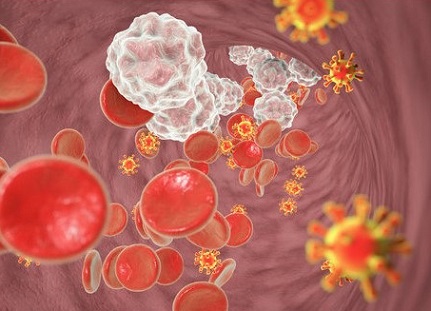BREAKING COVID-19 News! French Study Finds That SARS-CoV-2 Induced CD4 Cell Death Is Possibly Responsible For Long COVID!
Nikhil Prasad Fact checked by:Thailand Medical News Team Feb 02, 2024 1 year, 11 months, 14 hours, 39 minutes ago
COVID-19 News: The persistence of symptoms following the acute phase of SARS-CoV-2 infection, commonly referred to as long COVID, has emerged as a significant concern affecting approximately 10% of COVID-19 patients. To delve deeper into the pathophysiology of long COVID, a groundbreaking study conducted by Nîmes University Hospital in France, in collaboration with Centre National de la Recherche Scientifique (CNRS), Montpellier University, Institut National de la Santé et de la Recherche Médicale (INSERM), Université de Paris, and Laval University Research Center in Quebec, Canada, has shed light on a crucial aspect - the role of CD4 cell death during the acute phase of SARS-CoV-2 infection in predicting long-term sequelae.
 SARS-CoV-2 Induced CD4 Cell Death Is Possibly
SARS-CoV-2 Induced CD4 Cell Death Is Possibly
Responsible For Long COVID
Methodology
The study covered in this
COVID-19 News report aimed to comprehend the factors contributing to long COVID and recruited 29 patients hospitalized for SARS-CoV-2 infection. Utilizing advanced Luminex technology, the researchers quantified 19 soluble factors in their plasma and peripheral blood mononuclear cells (PBMCs), including inflammatory and anti-inflammatory cytokines, chemokines, Th1/Th2/Th17 cytokines, and endothelium activation markers. Flow cytometry was employed to measure T4, T8, and natural killer (NK) cell differentiation, activation, exhaustion, senescence, T cell apoptosis, and monocyte subpopulations. A year later, the team compared these markers between participants who developed long COVID and those who did not.
Results
Interestingly, the study revealed that none of the initially measured markers were predictive for long COVID, except for programmed T4 cell death. T4 lymphocytes from patients who later experienced long COVID exhibited higher levels of apoptosis compared to those who remained sequelae-free at the 12-month mark.
This observation led to the hypothesis that T4 cell death during the acute phase might be a critical factor paving the way for long COVID. Mechanistically, T4 lymphopenia could contribute to phenomena such as SARS-CoV-2 persistence, reactivation of other viruses, autoimmunity, and immune dysregulation. The study proposes that inhibiting T cell apoptosis, for example, through caspase inhibitors, could potentially prevent the development of long COVID.
Understanding Long COVID
Long COVID, defined by the persistence of symptoms for at least two months after the acute infection, poses a significant challenge as more than three-quarters of a billion COVID-19 cases have been reported globally. Symptoms range from asthenia, shortness of breath, and neurocognitive disorders to insomnia, anxiety, cardiovascular dysfunction, muscular weakness, and depression. Given the prevalence of long COVID, it becomes imperative to unravel its pathophysiology and identify markers that can predict its onset.
Markers of Severity
The severity of acute SARS-CoV-
2 infection has been identified as a crucial marker for long COVID. Hospitalized patients, particularly those in intensive care units (ICUs), are more prone to developing sequelae. Biomarkers like lactate dehydrogenase (LDH), C-reactive protein (CRP), tumor necrosis factor-α (TNF-α), interleukin-6 (IL-6), and others have been associated with COVID-19 severity and predict the likelihood of long COVID. Notably, the study found that markers of inflammation and severity during the acute phase did not predict long COVID in their cohort.
Immune Activation Profiles
To gain insights into the immune profiles of patients, the researchers measured a panel of soluble markers and analyzed cell surface markers during the acute phase of infection. Interestingly, patients who later developed long COVID did not exhibit significant differences in plasma levels of soluble markers compared to those who remained sequelae-free. However, the study observed alterations in T and NK cell differentiation, activation, exhaustion, senescence, and monocyte subpopulations in COVID-19 patients compared to healthy controls. These immune markers, while indicative of COVID-19 severity, did not differentiate between patients with or without long COVID.
T4 Apoptosis as a Predictor
The standout finding of the study was the link between programmed T4 cell death during the acute phase of SARS-CoV-2 infection and the subsequent development of long COVID. Patients who later presented long COVID had a significantly higher level of T4 apoptosis compared to those without sequelae. This observation suggests that T4 cell death might play a pivotal role in paving the way for long-term effects, potentially through mechanisms like SARS-CoV-2 persistence, reactivation of latent viruses, autoimmunity, and immune dysregulation.
Discussion and Implications
The study provides valuable insights into the complex pathophysiology of long COVID, emphasizing the role of T4 cell apoptosis during the acute phase of SARS-CoV-2 infection. While inflammation and severity markers during the acute phase did not predict long COVID, the intensity of T4 cell death emerged as a significant predictor. The study proposes that preventing T4 cell apoptosis, possibly through caspase inhibitors, could be a potential strategy to mitigate the development of long COVID.
The findings open avenues for further research and highlight the need for therapeutic interventions targeting T cell apoptosis in SARS-CoV-2 infection. Additionally, the study emphasizes the multifaceted nature of long COVID, suggesting that T4 cell death may contribute to various sequelae, including immune dysregulation, autoimmunity, and persistent viral infections. As the world grapples with the ongoing impact of the COVID-19 pandemic, understanding the underlying mechanisms of long COVID becomes paramount for developing effective preventive and therapeutic strategies.
The study findings were published in the peer reviewed journal: Frontiers in Immunology.
https://www.frontiersin.org/articles/10.3389/fimmu.2023.1335352/full
Thailand
Medical News would like to add that while this study used patients who were hospitalized for COVID-19, we will featuring a number of studies the next few days that shows aymptomatic and even mildy infected COVID-19 indivuals suffer CD4 cell death during the acute infection phase and also years after so called 'recovery'! Keep a lookout under this section:
https://www.thailandmedical.news/articles/covid-19---immunology
For the latest
COVID-19 News, keep on logging to Thailand Medical News.
